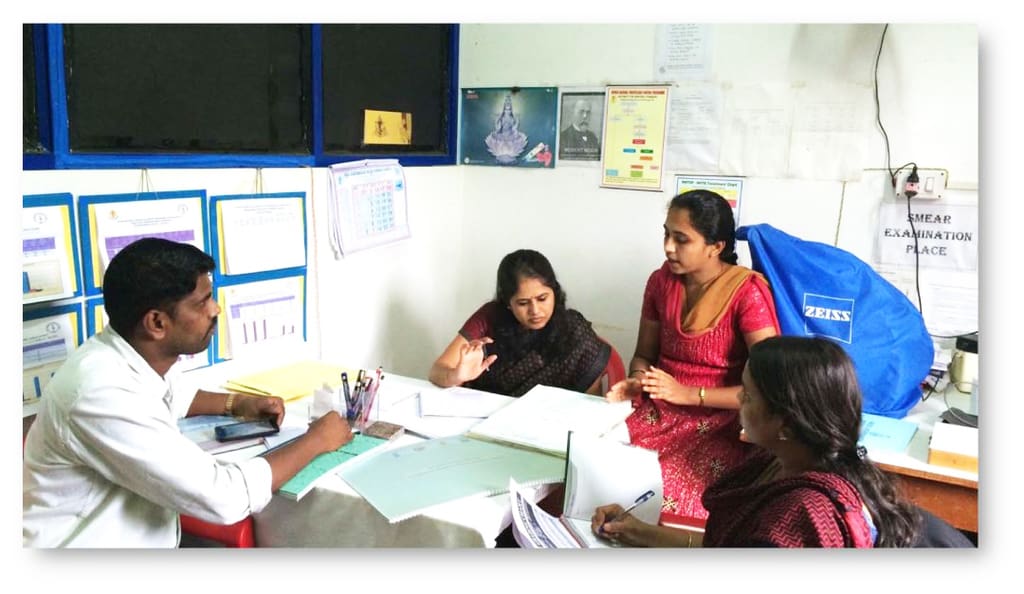Optimising the involvement of Private Practitioners in Tuberculosis Care and Control in Inida

Background
Dr Vijayashree Yellappa started her PhD in December 2012. Her study focuses on understanding the modalities foroptimizing the involvement of private practitioners in the National Health Programmes in India, using National Tuberculosis Control as a tracer condition. She is registered at Ghent University, Ghent, Belgium. Her promoters include Prof.Patrick Van der Styuft who teaches at Department of Medicine, Ghent University; Prof. Bart Criel, co-promoter from Department of Public Health, Institute of Tropical Medicine, Antwerp Belgium and local promoter Dr. N Devadasan, Director, Institute of Public Health, Bangalore, India. She is expected to complete her PhD by late 2016.
Introduction
In India, the private health sector plays an important role in the provision of health care. Government of India has been involving the Private Sector Providers (PSPs) through Public Private Partnerships (PPPs) in realising public health goals through different partnership mechanisms such as contracting, franchising, social marketing, vouchers and social health insurance. Assessment of these PPPs have concluded that they are context specific, do not allow for easy generalisations and that in most of the cases, individual charismatic leadership seems to have played a critical role in achieving the success. Given this context, we proposed to study PPP in National Tuberculosis Control (NTP) in Tumkur District, situated in Karnataka, South India.
NTP draws special attention here, because of its long history of efforts to involve PSPs, which dates back to 1995. NTP has been making systematic efforts to involve PSPs through PPM (Public Private Mix)-DOTS (Directly Observed Short Treatment Short Course) strategy to effectively link NTP with PSPs, so as to detect Tuberculosis (TB) suspects timely and provide standardised treatment to TB patients. For this purpose, NTP has published PPM-DOTS guidelines in 2001-2002. Despite the promise shown by few PPM-DOTS models, uptake of PPM schemes by PSPs has been poor. Currently, the NTP claims that several thousands of Private Practitioners (PPs) are collaborating under various PPM schemes, but in 2014 only 13,150 formal allopathic PPs in the entire country were involved with NTP. The vision of the GoI is for a ‘TB free India’. But, given this state of affairs, we do not know much about the factors determining the performance of PPM-TB. Hence, we proposed to study ‘what’ determines the performance of PPM-DOTS in India and understand ‘how’ and ‘why’ certain PPM-DOTS work or fail. In this study, we particularly focused on for-profit, formally trained, private practitioners (PPs) practicing modern medicine.
Methodology
The study consisted of two phases. Phase one employed mixed methods design (2012-2013). As a first step, we assessed the participation of PPs in the NTP for the year 2011 using secondary data. Since, comprehensive register of PPs practicing in the area was not available, we mapped the PPs using GPS. Quantitative analysis showed, none of the PPs had formally signed-up for any PPM scheme and only 24% of them had referred any case to NTP in in 2011 (Article can be accessed here). As a second step, we conducted a qualitative study in the same area with stakeholders like PPs, TB patients and NTP staff at sub district, district, state and national level to explore the barriers for collaboration.
In the Phase two (2014-2015), we designed an intervention package based on the recommendations given by various stakeholders in phase one research. The activities where aimed at improving the collaboration between PPs and the NTP. We chose quasi-experiment design to evaluate the intervention as it is delivered in a real world setting by proportionate random allocation of PPs (100 in each group) practicing in the study area to an intervention (receiving a package of interventions to improve referral and notification) and a control group. As main outcomes, we assessed the proportion of PPs referring presumptive TB cases to the NTP and the proportion of PPs notifying TB cases on private treatment to the NTP, in the intervention versus control group at the end of the intervention. The duration of the intervention was 12 months starting from December 2014.
1. Vijayashree Yellappa, T. Battaglioli, S. K. Gurum, D. Narayanan, P. Van der Stuyft .
Private practitioners’ contributions to the Revised National Tuberculosis Control Programme in a South Indian district. Int. Tuberc Lung Dis. 2016;20(5):659–665.
2. Vijayashree Yellappa, Pierre Lefèvre, T. Battaglioli, D. Narayanan, P. Van der Stuyft. Coping with tuberculosis and directly observed treatment: a qualitative study among patients from South India. BMC Health Services Research. 2016;16: 283.
3. Vijayashree Yellappa, Pierre Lefèvre, Tullia Battaglioli, Narayanan Devadasan, Patrick Van der Stuyft. Patients Pathways to Tuberculosis Diagnosis and Treatment in a Fragmented Health System: A Qualitative Study from a South Indian district.
- Vijayashree Yellappa, Pierre Lefèvre. COLLOQUIUM 2013 – Health Systems and Control of Neglected Diseases in Asia. ITM 3rd International Colloquium, November 2013;71
- Vijayashree Yellappa, Tullia Battagluuoli, Narayanana Devadasan, Patrick Vab der Styuft. Assessment of Private health providers’ participation in National Tuberculosis Programme in South India. Internation Journal of TB and Lung Disease;2013;17(12):338. 44th World Conference on Lung Health of the International Union Against Tuberculosis and Lung Disease, Paris, France, November 2013.
- Blog at International Health policies, advocating for collaborations with private sector on 03.06.2015: http://www.internationalhealthpolicies.org/regulate-or-collaborate-the-puzzle-of-private-medical-practitioners-engagement-in-disease-surveillance-in-india/.
- Newspaper, The Hindu, carried the research findings on 21.08.2016 in Science Tech division: http://www.thehindu.com/sci-tech/health/improving-access-to-dots-is-crucial/article9012067.ece. This coverage is based on our research paper titled ‘Coping with tuberculosis and directly observed treatment: a qualitative study among patients from South India’. BMC Health Services Research. 2016;16: 283.
- Newspaper, The Hindu, carried the research findings on 23.08.2016: http://www.thehindu.com/news/cities/bangalore/private-practitioners-not-fully-involved-in-fight-against-tb/article9019285.ece, demonstrating the poor involvement of Private doctors in the Indian National TB Programme. This is based on our research paper titled ‘Private practitioners’ contributions to the Revised National Tuberculosis Control Programme in a South Indian district‘. Int. Tuberc Lung Dis. 2016;20(5):659–665.
- Blog by a Science Journalist, https://journosdiary.com/2016/08/21/tb-dots-therapy-rntcp-flexible/ based on our paper titled‘Coping with tuberculosis and directly observed treatment: a qualitative study among patients from South India’. BMC Health Services Research. 2016;16: 283.
- News paper, Bangalore Mirror carried a news to showcase the poor involvement of private practitioners in TBNational TB Programme http://www.bangaloremirror.com/bangalore/others/Private-participation-in-TB-control-programme-abysmal/articleshow/53162986.cms. This is based on our research paperPrivate practitioners’ contributions to the Revised National Tuberculosis Control Programme in a South Indian district‘. Int. Tuberc Lung Dis. 2016;20(5):659–665.
1.This project which aimed to optimize the involvement of private practitioners in the National TB Control Programme, was selected as top 30 Social Innovation in the Global South. http://healthinnovationproject.org/india-institute-of-public-health/. Documentary movie of the same can be viewed at: https://www.youtube.com/watch?v=Pgo87hkz5Ok&feature=youtu.be
2. Foreign delegates visit Tumakuru TB centre
A foreign delegation comprising of policy makers, senior government officials, doctors and project managers visited Tumakuru District Tuberculosis Centre to study the Public Private Mix model of RNTCP(Revised National TB Control Programme) adopted by the District TB control officer in Tumakuru city on Wednesday. The 13 delegates from four African countries (South Africa. Malawi, Zimbabwe, Burkina Faso) including Chief Economist of African Development Bank Bineta Ba Diegne and Director, Policy Planning, Monitoring and Evaluation, Ministry of Health, Zimbabwe, Dr. Robert Mudyiradima visited the District TB Control Centre as part of the “Knowledge Exchange visit” and saw the facilities provided to the patients at the Centre and were briefed about the PPM model using power point presentation by Dr. Sanath Kumar G.K., District TB Control Officer.
The 13 delegates from four African countries (South Africa. Malawi, Zimbabwe, Burkina Faso) including Chief Economist of African Development Bank Bineta Ba Diegne and Director, Policy Planning, Monitoring and Evaluation, Ministry of Health, Zimbabwe, Dr. Robert Mudyiradima visited the District TB Control Centre as part of the “Knowledge Exchange visit” and saw the facilities provided to the patients at the Centre and were briefed about the PPM model using power point presentation by Dr. Sanath Kumar G.K., District TB Control Officer.
Dr. Vijayashree Yellappa, faculty, Institute of Public Health, Bengaluru, interacted with the delegates and gave a detailed talk on the project.The Knowledge Exchange visit is sponsored by African Development Bank and supported by  Department of Economic Affairs, Ministry of Finance, Government of India.The delegation also spoke to private medical practitioners and laboratory technicians and other staff at the TB Centre.The members of the delegation said that it was a good learning experience.
Department of Economic Affairs, Ministry of Finance, Government of India.The delegation also spoke to private medical practitioners and laboratory technicians and other staff at the TB Centre.The members of the delegation said that it was a good learning experience.





